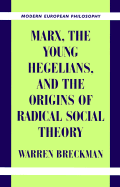Book contents
- Frontmatter
- Contents
- Acknowledgments
- Introduction
- 1 At the End of Idealism: From “Nihilism” to “Positive Philosophy”
- 2 The Transcendent Sovereign and the Political Theology of Restoration
- 3 Ludwig Feuerbach and Christian Civil Society
- 4 The Social and Political Discourse of Personality, 1835–1840
- 5 Pantheism, Social Question, and the Third Age
- 6 Arnold Ruge: Radical Democracy and the Politics of Personhood, 1838–1843
- 7 Karl Marx: From Social Republicanism to Communism
- Conclusion
- Bibliography
- Index
Introduction
Published online by Cambridge University Press: 11 January 2010
- Frontmatter
- Contents
- Acknowledgments
- Introduction
- 1 At the End of Idealism: From “Nihilism” to “Positive Philosophy”
- 2 The Transcendent Sovereign and the Political Theology of Restoration
- 3 Ludwig Feuerbach and Christian Civil Society
- 4 The Social and Political Discourse of Personality, 1835–1840
- 5 Pantheism, Social Question, and the Third Age
- 6 Arnold Ruge: Radical Democracy and the Politics of Personhood, 1838–1843
- 7 Karl Marx: From Social Republicanism to Communism
- Conclusion
- Bibliography
- Index
Summary
It is now a question, so to speak, of founding a Kingdom, the Kingdom of the Idea, of thought which contemplates itself in all that exists and is conscious of itself. The founder of this Kingdom will naturally bear no name, will not be an individual, or will be this individual which alone is, the World Spirit. Further, it is a question of overthrowing from its throne the ego, the self in general, which, especially since the beginning of Christianity, has dominated the world, which has conceived itself as the only spirit to exist.
(Ludwig Feuerbach to Hegel, 1828)When the communist regimes of the European East Bloc recently toppled in an inverted version of the domino theory, a feature of political thought that had largely escaped notice among western political theorists in the 1970s and 1980s abruptly moved into the foreground. That is, the dissidents of central and eastern Europe contributed greatly to the recovery of “civil society” as a descriptive and normative political concept. An idea rooted in the high age of bourgeois political self-assertion against absolutist and feudalist ideals of social order, civil society had all but fallen from use in the twentieth century. Revived by dissidents like Vaclav Havel and Adam Michnik as a weapon against the oppressive regimes of the Soviet Bloc, the ideal of civil society pitted society against the state, association against sovereignty, plurality against unity, civility against force, persuasion against coercion.
- Type
- Chapter
- Information
- Marx, the Young Hegelians, and the Origins of Radical Social TheoryDethroning the Self, pp. 1 - 19Publisher: Cambridge University PressPrint publication year: 1998

